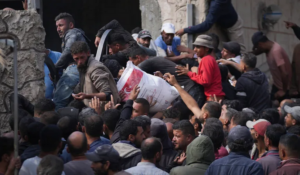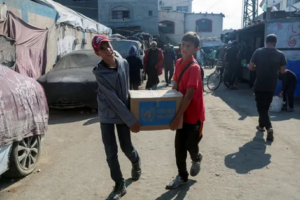Senior UNRWA official warns Gaza aid distribution will collapse unless Israel’s ban lifted

UNRWA workers distribute flour in Deir al-Balah, central Gaza, 3 November 2024
Nir Hasson reports in Haaretz on 5 November 2024:
Israel has no alternative to the services provided in Gaza by UNRWA, the UN agency for Palestinian refugees, according to Juliette Touma, the director of communications for the agency.
Touma warns that shutting down UNRWA’s work could lead to a total collapse of food distribution and humanitarian aid systems intended for Gaza’s two million residents.
The Israeli Foreign Ministry announced Monday its intention to revoke the 1967 agreement between Israel and the United Nations that provides the legal framework for UNRWA’s operations in Gaza, Jerusalem and the West Bank.
While the ministry claims that only 13 percent of aid entering Gaza is distributed through UNRWA, the agency counters that this reflects a misunderstanding of the aid distribution mechanism, asserting that UNRWA alone has the capability to distribute aid throughout Gaza.
UNRWA is Gaza’s largest employer, with a pre-war workforce of approximately 13,000, mostly teachers, now reduced to 5,000 – many of whom the agency considers essential to preventing a humanitarian catastrophe.
Other aid organizations rely on UNRWA’s logistics capacity to transport their purchased aid and coordinate between various entities operating in Gaza.
“We have doctors, nurses, paramedics, drivers, logistics staff and more,” says Touma. “It is, practically speaking, impossible to replace this agency – and [to do] it all in the middle of a brutal war?”
Since the war began, UNRWA has provided food to approximately 1.9 million Gaza residents, with its clinics recording around 6 million patient visits. Hundreds of thousands of displaced people have been sheltering in UNRWA facilities since the war’s outbreak – the agency provides shelter to more Gazans than any other organization in the Strip.
As a UN agency, UNRWA’s refugee facilities are protected by UN diplomatic immunity – meaning Israel is obligated to avoid targeting them. This immunity, along with the operational management of these facilities, would be lost if the agency is forced to shut down. UNRWA staff were responsible for vaccinating 600,000 Gazan children against polio, and the agency remains the only organization authorized to deliver fuel for humanitarian activities in Gaza.
Before the war, UNRWA operated Gaza’s largest educational system, serving more than half of Gaza’s children. However, this marks the second consecutive year without regular schooling in Gaza, with only 50,000 students currently attending UNICEF-run learning centers. “If there’s a cease-fire, what will happen to these children? Who will educate them? The Palestinian Authority can’t even pay its own teachers. It’s simply impossible to replace UNRWA,” Touma says.

Children carrying an aid package provided by UNRWA in Deir al-Balah on 5 November 2024
“If there will be a cease-fire, what will be the fate of these children? Who will supply education to these children? The Palestinian Authority that can’t manage to pay its teachers? It’s simply impossible to replace UNRWA,” says Touma. The agency also runs schools in East Jerusalem and the West Bank, with about 50,000 students.
While Israel alleges that UNRWA schools promote incitement, Touma points out that their schools use the same textbooks as Palestinian Authority schools. “Only that in our schools we also must follow the principles of the UN, so our schools are the only ones that teach human rights and the UN resolutions concerning peace in the Middle East,” she says. “Another myth that needs to be challenged is that we work closely with Hamas. Our system was attacked by Hamas because of the content we teach.”
UNRWA maintains that the Israeli public has been subjected to a deliberate disinformation campaign aimed at delegitimizing the agency.
They acknowledge that in the first months of the war, Israel provided a list of 18 UNRWA employees that it linked to the October 7 massacre, Hamas or other armed groups – but note this represents a tiny fraction of their total workforce.
During the summer, Israel submitted an additional list of about 100 UNRWA employees allegedly connected to Hamas, but the agency contends no evidence was provided to substantiate these claims. “I want to tell the Israeli public that in the end people live in Gaza,” Touma says. “At the top of the list of priorities need to be three things – a cease-fire, release of all the hostages and the return of supplies to the Gaza Strip as there was before the war. These are the three priorities that the focus should be on and not banning UNRWA.”
Touma adds, “There’s an assumption that if we close UNRWA, then we will cancel the Palestinian refugees, but this is a naïve view. UNRWA doesn’t have a mandate to solve the Palestinian refugee problem, its mandate is only to supply them with services. If we stop the medical and educational services for them, we won’t solve any problem. The solution needs to be diplomatic negotiations.”
The two laws passed by the Knesset last week are set to take effect in three months, at which point UNRWA will cease operations in Gaza, the West Bank, and Jerusalem.
The first law, which bans UNRWA from operating within Israel, passed with 92 Knesset members in favor and 10 opposed. According to this legislation, “UNRWA will not maintain any representation, provide any services, or conduct any activities, directly or indirectly, within the sovereign territory of the State of Israel.”
This means an end to the agency’s operations in East Jerusalem – particularly in the Shoafat refugee camp, where it currently provides residents with sanitation, education, health care, and other essential services.
The new legislation may also complicate Israeli banks’ ability to work with UNRWA. Senior agency officials express concern that the law will lead to the collapse of UNRWA’s administrative systems in the West Bank and Gaza Strip, as it will create difficulties in paying salaries and suppliers – payments that are currently processed through financial entities like Israel’s Bank Leumi.
The Knesset also approved a second law concerning UNRWA, prohibiting any state authority – including bodies and individuals with a public role according to the law – from maintaining contact with UNRWA or its representatives.
Consequently, the Coordinator of Government Activities in the Territories will be forced to terminate its working relationship with the agency.
The law also revokes the tax exemptions and diplomatic immunities previously granted to the agency. This second measure passed with 87 Knesset members in favor and nine opposed. Within the international community, there is speculation that after the U.S. presidential election, diplomatic pressure will be applied to prevent Israel from closing the agency. The British government has already announced that this legislation will result in increased sanctions against Israel.
Despite the overwhelming majority support for both laws in the Knesset, Prime Minister Benjamin Netanyahu and Foreign Minister Israel Katz were notably absent from the vote.
According to sources in Jerusalem, their absence was strategic – allowing them to tell foreign countries that the decision was driven by pressure from Knesset members rather than led by the government.
This article is reproduced in its entirety
